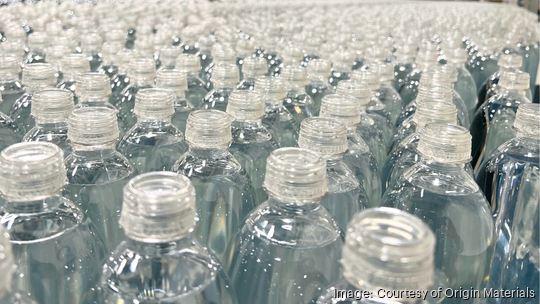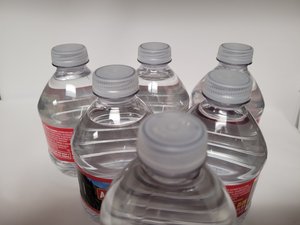
This article is part of a series addressing environmental sustainability opportunities and challenges in the Sacramento region.
West Sacramento materials-science company Origin Materials Inc. started in 2008 with a goal to remove petroleum from plastics, replacing oil with renewable zero-carbon biomass like scrap wood.
It is still Origin’s audacious goal to decarbonize plastic worldwide, but since building billion-dollar manufacturing plants is a financial strain on a small company, it has been looking at ways to roll out revenue-generating products to keep its balance sheet healthy.
“We wanted to bring on a faster cycle of business that generates revenue and income to take the risk off the corporation,” said co-CEO John Bissell.
Enter the first fully recyclable PET plastic bottle caps, which Origin (Nasdaq: ORGN) pioneered and introduced this year and plans to start selling at scale by year’s end.
Origin’s main business is still using waste wood to make zero-carbon plastic precursor chemicals that are a drop-in replacement for petroleum in the manufacture of PET plastic, the most recycled plastic on the planet.
The company last year opened its first commercial PET plant in Canada at a cost of $130 million. Origin’s following plant in Louisiana will take several years to open and will cost more than $1.6 billion.
Origin anticipates that its new business of manufacturing recyclable PET plastic caps and closures for beverages could add $45 million to $65 million in annual revenue starting next year, said co-CEO Rich Riley.
The company has customers for its first foray into PET caps and is procuring additional capacity, he said. “We will continue adding lines forever. It is a $65 billion market,” Riley said. “We are very much just getting started. Customer orders are incredible.”
Most plastic beverage bottles are made from fully recyclable PET plastic, while most plastic bottle caps are made from softer HDPE plastic, which breaks down with recycling. Asked why caps have not previously been made of PET, Bissell said it’s a difficult material science challenge.
When forming the cap, it needs to have tight specifications and precision on the threads or it won’t seal. Most caps are made of softer versions of plastic, and they are formed on molds and pulled off, rather than unthreaded. PET tends to break if you pull it off the mold.
Origin got around the problems by using different equipment, using a different forming process and creating a different cap design. It works on existing bottling lines.
The company has successfully run hundreds of thousands of caps through manufacturing and bottled both still and carbonated beverages, Bissell said, adding that the company has seen significant industry response.
“We saw tremendous interest, frankly more than we were expecting. It was incredible,” he said. The first commercial cap line will be installed later this year at a partner location. Origin isn’t saying where that will be yet.
“When you are developing a set of new molecules, you have to look at new application development for them,” Bissell said. “Caps is a problem that the industry had for material science challenges.”
But the move into caps hasn’t silenced critics and analysts, who are more interested in Origin’s biomass conversion technology, which is what the company was selling when it went public in 2021.
“There are plenty of startups that have made abrupt changes in business strategy, and Origin is a case study of exactly that. Needless to say, investors tend to penalize management teams that go down the path of revamping what had been a long-standing strategy,” said Pavel Molchanov, managing director and equity research analyst in the energy group in Houston for St. Petersburg, Florida-based financial firm Raymond James & Associates Inc. “The fact that the company is optimistic about the ‘caps and closures’ opportunity is encouraging, but it cannot be a full substitute for building the Origin 2 plant. It was the sudden shift in the strategy around Origin 2 that caused such a painful drop in the stock one year ago.”
Last summer, Origin said it would open its Louisiana plant in phases rather than all at once, and that its first products would be biofuel, rather than renewable plastic.
The company’s shares lost three-quarters of their value on that announcement. Lots of companies make biofuel, Molchanov said. Origin’s primary value proposition is its zero-carbon plastic.









